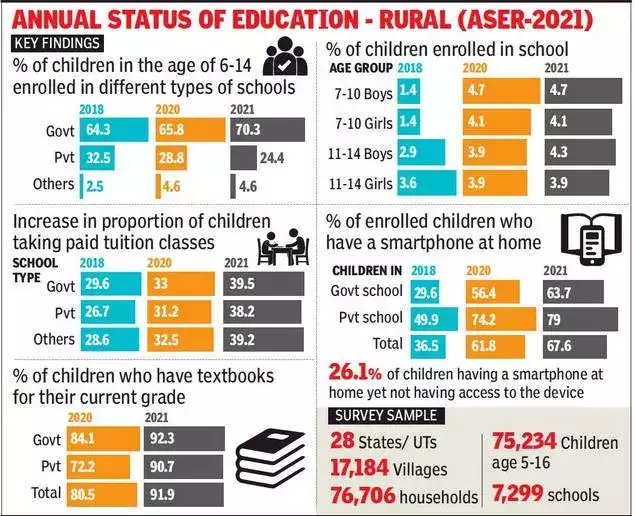Description

Copyright infringement not intended
Context: Recently Annual Status of Education Reports (ASER) have raised Concerns over online education.
Details
- The Annual Status of Education Report (ASER 2021) survey has studied the impact of Covid-19 on learning outcomes.
- According to the report;
- 70% of children in Classes IX to XII had a Smartphone at home, but only 35% of them use it for studies.
- Declining female learning due to increased requirement of care work at home and financial stress on the family due to covid-19.
- Almost 90% of females aged 14-18 did housework on a daily basis.
- The report found that 14–18-year-old male youth wants to join ‘Army/Police’ and ‘Engineer’, while female youth preferred ‘Teacher’ and ‘Doctor/Nurse’ as their occupation.
Annual Status of Education Report (ASER)
- ASER is an annual survey that aims to provide district-level information on children’s enrolment and basic learning.
- The Survey has been conducted every year since 2005 in all rural districts of India.
- It is a household-based survey rather than a school-based survey.
- This enables all children to be included; those who have never been to school or have dropped out, as well as those who are in government schools, private schools, religious schools or anywhere else.
- Information on learning is collected from children in the age group 3-16.
- Basic household information is also collected.
- Recently, this has included household size, parental education, and some information on household assets.
- Children in the age group 5-16 are tested in basic reading and basic arithmetic.
- ASER standards have been adopted in several countries: Kenya, Uganda, Tanzania, Pakistan, Mali and Senegal.
Annual Status of Education Report (ASER 2021)
- The survey shows an increasing dependence on private tuition.
- Digital Divide: Access to smartphones and internet connection is the key concern.
- Increasing Enrollment in Government School
- Many Students shifted from private to government schools; from 64.3% in 2018 to 65.8% in 2020, to 70.3% in 2021.
- A decline in private school enrolment from 28.8% in 2020 to 24.4% in 2021.
- Irregular Pre-primary classes or Anganwadi due to covid-19, and lack of access to digital devices, have left the young students
Challenges in Indian Education System
- India has achieved universal enrolment at the elementary level. This is a great achievement, but getting Students to School is only the beginning of human Capital formation.
- Poor quality of facilities, Shortage of qualified faculty.
- Out of date Curriculum, Limited university-industry Partnership.
- Indian origin Scientists have won the Nobel Prize, but post-independence work done in India has not led to a Science novel. If Indians Studying and working abroad can have a great impact, then obviously the problem has to do with our Systems of education and research.
- Broken governance System. There are few rewards for being a good teacher and few Punishments for being a Careless one. Need more effective and accountable governance Systems.
- The greed of Private Colleges to earn the maximum from every Student puts traumatic Pressure on Students which results in mental breakdown.
- More girls than boys drop out of School. While boys drop out to work, girls usually Stay at home and help with domestic Work. Social Conception of gender roles is an important factor.
- Learning loss due to pandemics and the digital divide.
Steps by the Government
- The 86th Constitution Amendment provides the Fundamental right to free and compulsory education under Article 21A includes a Common education System where the “rich and Poor are educated under one roof".
- Rashtriya Uchchatar Shiksha Abhiyan provides funding to eligible State higher educational institutions.
- Declaration of Educational Institutions as institutions of Eminence, to provide world-class education to Indian Students within the Country.
- Creation of Higher Education Financing Agency, for high-quality infrastructure in Premier educational institutions.
- National Institution Ranking Framework for ranking our higher education institutions.
- GIAN Initiative to invite distinguished academicians, entrepreneurs, scientists, and experts from premier institutions across the world to teach in higher educational institutions in India.
- SWAYAM Portal for online Courses.
- SWAYAM Prabha Provide HD educational Channels through DTH on a 24X7 basis.
- Sodhganga to develop a national repository of universities in India, digital Study material for higher education.
- Samagra Shiksha Scheme to ensure inclusive and equitable quality education at all levels of school education.
- The government is encouraging Open Online Courses via Swayam Platforms So that Students Can have access to quality lectures online.
- Artificial Intelligence (AI) can be used to Provide Personalized instructions based on Student needs.
- The government needs to work on improving digital infrastructure and ensure that students have access to mobile phones or laptops.
https://www.thehindu.com/opinion/op-ed/state-of-adolescent-learning/article65312061.ece













